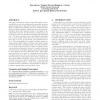Free Online Productivity Tools
i2Speak
i2Symbol
i2OCR
iTex2Img
iWeb2Print
iWeb2Shot
i2Type
iPdf2Split
iPdf2Merge
i2Bopomofo
i2Arabic
i2Style
i2Image
i2PDF
iLatex2Rtf
Sci2ools
117
click to vote
ATAL
2009
Springer
2009
Springer
Incorporating helpful behavior into collaborative planning
This paper considers the design of agent strategies for deciding whether to help other members of a group with whom an agent is engaged in a collaborative activity. Three characteristics of collaborative planning must be addressed by these decision-making strategies: agents may have only partial information about their partners’ plans for sub-tasks of the collaborative activity; the effectiveness of helping may not be known a priori; and, helping actions have some associated cost. The paper proposes a novel probabilistic representation of other agents’ beliefs about the recipes selected for their own or for the group activity, given partial information. This representation is compact, and thus makes reasoning about helpful behavior tractable. The paper presents a decision-theoretic mechanism that uses this representation to make decisions about two kinds of helpful actions: communicating information relevant to a partner’s plans for some sub-action, and adding domain actions th...
Related Content
| Added | 26 May 2010 |
| Updated | 26 May 2010 |
| Type | Conference |
| Year | 2009 |
| Where | ATAL |
| Authors | Ece Kamar, Ya'akov Gal, Barbara J. Grosz |
Comments (0)

